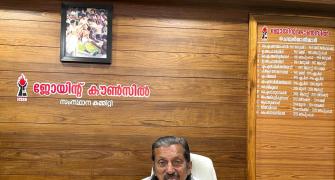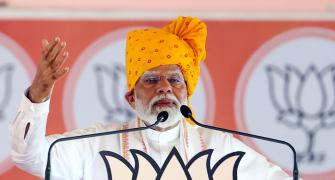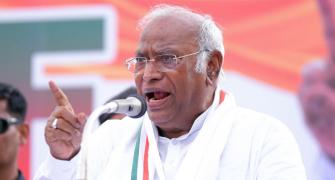Study in the United Kingdom may be expensive but it is the best in the world, says Dan Chugg, the First Secretary and the official spokesman of the British High Commission in New Delhi, in an exclusive phone interview.
We also spoke to Gurpreet Wadhera, Head-Operations; English Programs at BetterThink, Ludhiana, the language division of Top Careers & You (TCY). These experts throw light on various issues concerning a prospective Indian student desiring to pursue his/her studies in the land of the Cambridge and the Oxford.
How much weightage do you give to the Indian education from the visa point of view?
Dan: A degree from an Indian university is as good as one from any other country and we give it the same weightage. For example, under the points system, students get points for having a (graduation) degree or a post-graduation degree.
S/he gets the same number of points as he gets from an Indian university or from a British or a French university. Our eligibility criteria are very simple. If somebody comes to us with a letter saying he has been accepted by a UK university, has got a place to stay and has a proof of enough funds, s/he is given a student visa.
Is work experience mandatory for students pursuing their MBA after graduation?
Dan: It entirely depends on the course. Some courses would expect a student to have work experience before going for an MBA study. On the other hand, some MBAs in the UK are deliberately designed for mid-career professionals but other MBAs would be free to take students straight from the university.
How does the knowledge of English language affect a student's job prospects in Britain?
Dan: I think, firstly it affects him/her as a student. To be able to study in the UK s/he must have sufficient knowledge of English to enable him/her to take the course. If his/her English is very poor then it would be very difficult to get the required qualifications. Following that, if s/he is looking for a job it would depend on what kind of job and how good his/her English needs to be. For some jobs perfect English is required and for others English may not be that important.
Gurpreet: It is pertinent for a student to have a good knowledge of the English language. S/he should be really good at all the four skills -- Reading, Writing, Listening and Speaking. No wonder, the High Commission wants a student to show a good English proficiency by requiring him to clear an IELTS test. Good preparation is the key.
How much is the British accent important for jobs in the UK?
Dan: I don't think the British accent is important at all. It is important that the person should be able to communicate well.
Gurpreet: Most Indians have a neutral accent which is accepted universally. An ability to communicate well in English is more important.
Is the IELTS compulsory for everybody? Does the UK accept TOEFL score as well?
Dan: For admission into a UK education institution, they (universities) need proof that an Indian student can speak appropriate English. But if the university doesn't set any minimum standard, we would expect the student to have at least the level of IELTS of 5.5 minimum score or an equivalent level to that. It would be fine if s/he has a TOEFL score instead. We have set the standard and if s/he is not able to score, we feel that s/he won't be able to complete the course. So, we don't issue a visa.
Gurpreet: IELTS basically is a test of English language that proves the proficiency of a candidate in the language. It is mandatory for a native of any non-English speaking country if he wants to live in the UK at any status. A minimum 5.5 band score is accepted to go to the UK. This score proves the minimum level of understanding of this language that helps the student communicate and complete his studies. TOEFL is also accepted by some of the universities.
Are any scholarships available for bright Indian students who may not be financially that strong?
Dan: Yes, there are lots of scholarships available from universities who have their independent scholarship schemes. So, it would be appropriate for the students to try and find out what types of scholarships are available for them. The British Government also offers a few scholarships. It has got the Chevening scholarship scheme, a very prestigious scheme for very outstanding candidates; a scholarship from the Cambridge university, and there are also some Commonwealth scholarships.
Gurpreet: Definitely, scholarships are available for bright candidates. Students can check with the university for the sholarships available and their eligibility criteria.
Can students go for a part-time job along with their studies? If yes, how easy or difficult it is for a student to find a job in the UK?
Dan: A student can work part-time in the UK if s/he is studying for more than six months. S/he can work for up to 20 hours a week and full-time during vacations. Regarding how easy it is to find a job, t depends on where one is living, what kind of job one is looking for, and how skilful the candidate is. So, it very much depends on the situation.
Many types of jobs are available. For a post-graduate student there can be an option of lecturing or tutoring at the university. Students with very specialised skills like IT and business professionals can get high-level jobs during vacations in city companies. Undergraduates can get those kinds of jobs generally the British citizens do during vacations.
Gurpreet: Students can work part-time if they are enrolled for a course for duration of more than six months. Different jobs are available for undergraduate and graduate students. If a student has the skill level that is in demand in that particular area he is living in, it won't be difficult for him to find a suitable job.
Which universities and courses are in high demand these days?
Dan: I think it varies from university to university. It is very difficult to say if one course is in high demand. While it is also true that some of the universities like Oxford, Cambridge and Kings College London, etc. are in high demand, on the other hand, some lesser known universities offer very good education and extremely good courses. And admission into them is not quite difficult.
In the UK you can take an admission to any course you want to, provided, of course, you qualify for it. The courses cover absolutely everything imaginable, from Law to Engineering to Medicine to media studies to Journalism, etc.
Gurpreet: There are various universities offering a number of courses. It won't be right to say that some particular courses are more in demand in the UK. This depends on the student which course he wants to go in and also the kind of skill set he wants to develop in himself.
Do you think the recent immigration law changes are 'too scary' for oversees students?
DAN: I don't think why it should be. The recent immigration changes should have made it in fact less scary, more transparent and easier. If you go to the website https://www.gov.uk/apply-uk-visa, you will come to know about the criteria you need to fulfill before applying for visa. People get an idea whether they would be able to fulfill those criteria or not.
Gurpreet: The UK immigration demands for a minimum level of English language so that the prospective immigrants are able to work and understand that culture well. I think things are quite clear and transparent under the new system. Before applying for immigration to the UK, the candidate can well assess whether he is eligible for immigration or not.
How easy or difficult it is to settle down (permanent residency) in Britain?
Dan: You can't get a permanent residency just because you have been a student there. You have to have lived in the UK as a worker on a work-permit for the right number of years before you get a settlement visa. Your time spent as a student doesn't count towards those years.
Well, it is unlikely that a student qualify for a permanent residency. First he has to apply for a work permit. He has to work in the UK for several years before he can apply for residency. Currently, students can get one year work-permits, after they finish their studies, but as of this summer this is going to change. Now the students will get a two-year work-permit.
How would you rate the UK, the US and Australia from the student's perspective?
Dan: Well, the UK has some of the very best universities in the entire world. Going by the recent rankings of global universities, three of the top five universities of the world are in the UK. If you look at some of the universities by the subject-area, the UK is very top on the list.
There is no doubt that the UK has some of the very best universities in the world. From a student's perspective, if you want a very high quality education, they are nowhere nearly comparable with the UK. Some people are concerned that the UK is expensive and they can get cheaper education elsewhere. I must say, if you really want good education probably the UK is the best. We still offer more student visas than the Australians issue every year -- issued 23,000 student visas last year.
It is true that Australia is growing in importance for the Indian students, but one of the reasons is it is cheaper to study in Australia than the UK. Slightly more students go to the USA than the UK may be because it is a bigger country and has more universities.
In your experience, do you think the Indian students assimilate well into the UK culture?
Dan: We find that of all the students in the UK, those of Chinese and the Indian origin do better than anybody else and that includes the students who have been brought up in the UK. They contribute a huge amount, they are very able, hard-working students and give very good results in the end.
Do you have any advice for Indian students planning to pursue their studies in Britain?
Dan: My advice to Indian students would be to do a lot of preparation in advance. They must know what courses the universities are offering. Look for the sources of funding and available scholarships at the British Council website. I suggest students leave lots of time to apply for the courses, funding, visa and booking a flight because there are a lot of processes to go through.
Top Careers & You (TCY) is an organisation that trains national and international students for high-end examinations viz. GRE, GMAT, CAT, SAT, IELTS and TOEFL.







